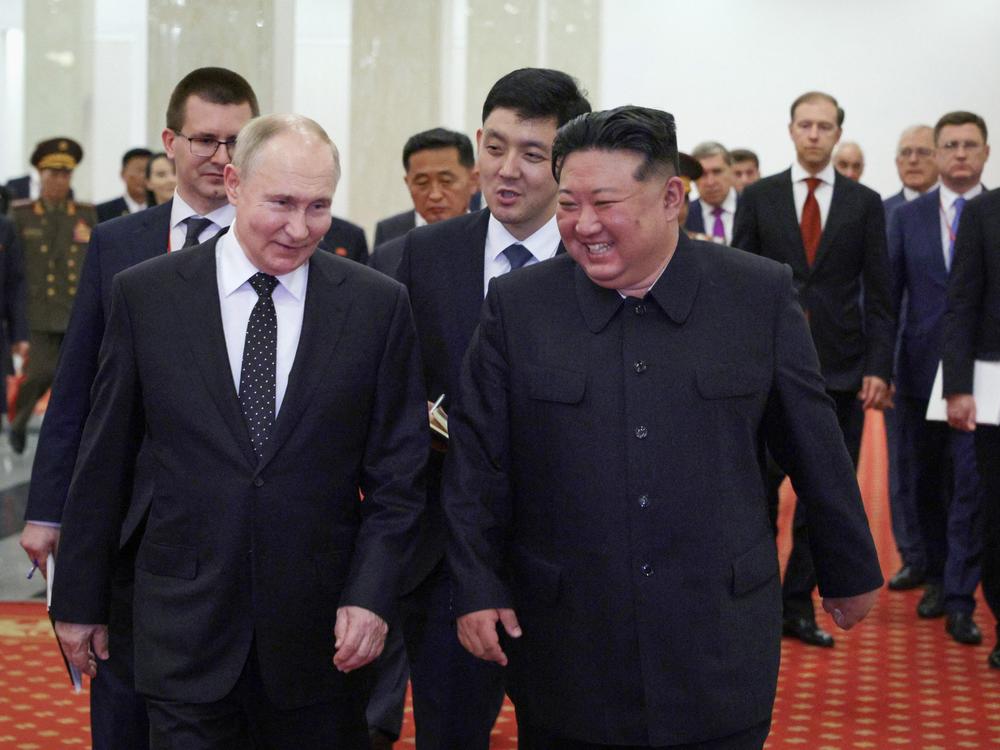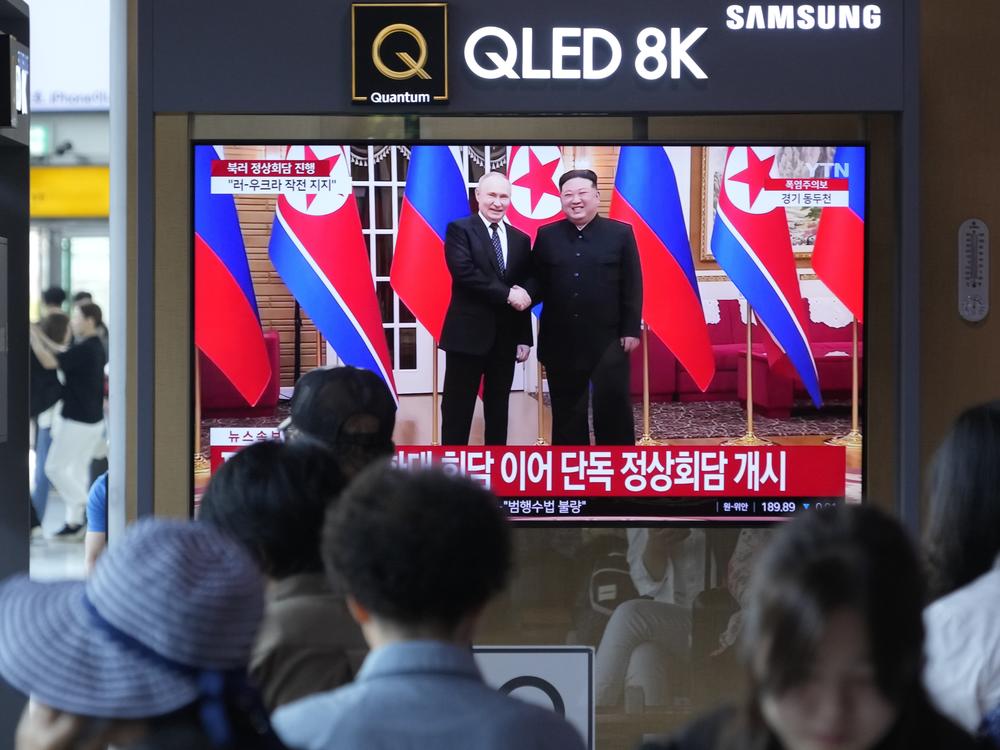Section Branding
Header Content
Concerns mount as Russia and North Korea commit to a mutual defense pact
Primary Content
SEOUL, South Korea — Foreign governments expressed concern about a treaty between Russia and North Korea that commits the two countries to providing military assistance to each other, if either of them is invaded.
Russian President Vladimir Putin and North Korean leader Kim Jong Un signed the treaty Wednesday, during Putin’s visit to Pyongyang.
The treaty upgrades the countries' relationship to a “comprehensive strategic partnership.” It specifies that if either side goes to war after being invaded, “the other side shall provide military and other assistance with all means in its possession without delay,” according to a treaty text published Thursday by North Korean state media.
“For all intents and purposes, this is an alliance pact,” says Artyom Lukin, a political scientist at Far Eastern Federal University in Vladivostok, Russia. “It might mean that Russia and North Korea would fight in each other's military conflicts.”
Lukin argues that it’s no accident that the treaty uses similar language to a 1961 pact between the Soviet Union and North Korea. “I think it was done in order to show that Moscow and Kim Jong [Un] are, again, political and military allies like during the Cold War,” he says.
The treaty adds to the 1961 pact several preconditions for providing military assistance. The aid must be in line with Russian and North Korean national laws and Article 51 of the United Nations Charter, which affirms the right of individual or collective self-defense for member nations under attack.
Whatever obligations and preconditions the treaty contains, experts note, they key factor will be how the two nations decide to interpret and implement the pact.
North Korea is already accused of sending Russia munitions to use in its war in Ukraine, in exchange for food, fuel and military technology. Both countries publicly deny such a swap, but the treaty could serve to justify it, and embolden them to do even more.
Putin and Kim “seem ready to ramp up the stakes and take risks,” says Lukin. “I would say that nothing is off the table.”
For example, if Pyongyang and Moscow agree on it, “it's possible that the North Korean military may dispatch soldiers to fight battles” for Russia in Ukraine, recruit volunteers or send “mercenaries to earn foreign currency,” says Chang Yong Seok, a researcher at Seoul National University’s Institute for Peace and Unification Studies.
Or, if the war in Ukraine goes badly for Russia, Chang says, it’s conceivable for North Korea to launch a military provocation “to open a second front in Northeast Asia to distract the military power and attention of the U.S. and the West.”
As for North Korea, they already have an estimated 50 nuclear warheads, and Lukin and other experts believe Russia is unwilling to share high-level nuclear and military technology.
“The problem is that even secondary technologies can significantly improve North Korea's weapons development,” Chang notes. “And the impact on military balance on the Korean Peninsula can be huge.”
The treaty also says that Russia and North Korea will oppose “unilateral compulsory measures,” a reference to international sanctions against both countries — North Korea for its nuclear and missile programs, and Russia for its invasion of Ukraine.
Russia used to support international sanctions against North Korea. But more recently, Moscow has blocked U.N. Security Council efforts to tighten sanctions on Pyongyang, and in March, vetoed the extension of a mandate for a UN panel that monitors implementation of UN sanctions on North Korea.
In an article published by North Korea’s Rodong Sinmun newspaper, and on the Kremlin’s website, Putin wrote, “we will develop alternative trade and mutual settlements mechanisms not controlled by the West.”
This could be a throwback to a Cold War-era financial settlement system, says Hong Min, a North Korea expert at the Korea Institute for National Unification, a Seoul-based government think tank.
“If, for example, North Korea provides weapons,” he says, “the value of those provisions will be converted to a ruble amount, and North Korea would be paid back in kind, like with food. Essentially, this a barter system that assessed value in rubles."
Japan expressed grave concern about the pact, while NATO Secretary-General Jens Stoltenberg commented that the agreement showed authoritarian powers were aligning.
South Korea condemned the treaty, and said it would reconsider its policy of refraining from sending arms directly to Ukraine, instead of backfilling stockpiles of U.S. and Polish munitions.
China, which has been North Korea’s only real ally since the end of the Cold War, reacted coolly to the Putin-Kim summit, calling it a bilateral matter.
While Putin and Kim met in Pyongyang, Chinese diplomats and military officials were holding talks in Seoul. This followed a trilateral summit with the leaders of Japan and South Korea, as China tried to stabilize ties with its neighbors, despite rivalry with their ally, the U.S.
Some experts see the Putin-Kim summit as a comparatively bigger win for Kim.
“Putin's focus is on building a system for securing the military assistance Russia urgently needs right now,” says Hong Min, “whereas North Korea is focused on showing off their alliance as much as possible.”
“From North Korea’s point of view,” adds Chang Yong Seok, “they’re being treated as a global actor, albeit as Russia’s junior partner.”
“That’s a huge political and diplomatic achievement,” he adds, “and it may be the kind of outcome Kim Jong Un wanted the most and finds very satisfying.”
On Thursday, Putin went on to visit Vietnam, where he signed at least a dozen deals with the country in another step to bolster Russia's relations in Asia.
NPR’s Se Eun Gong contributed to this report in Seoul.


